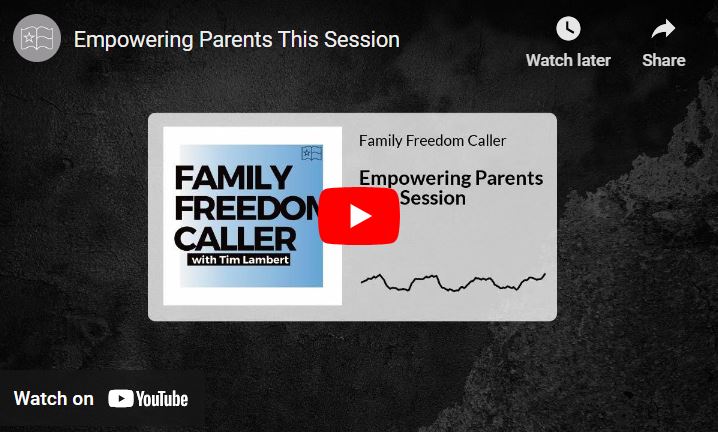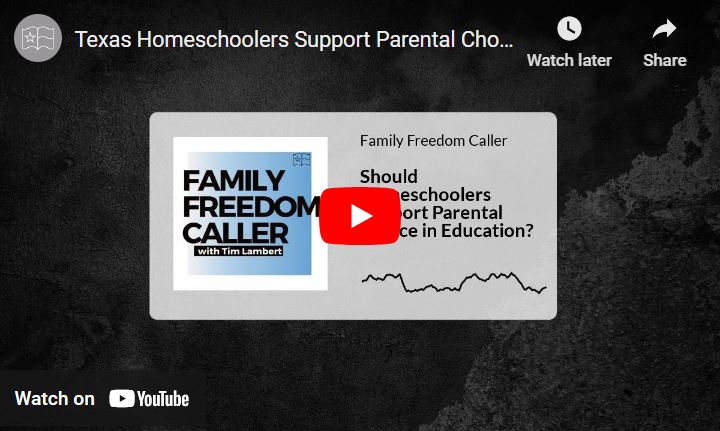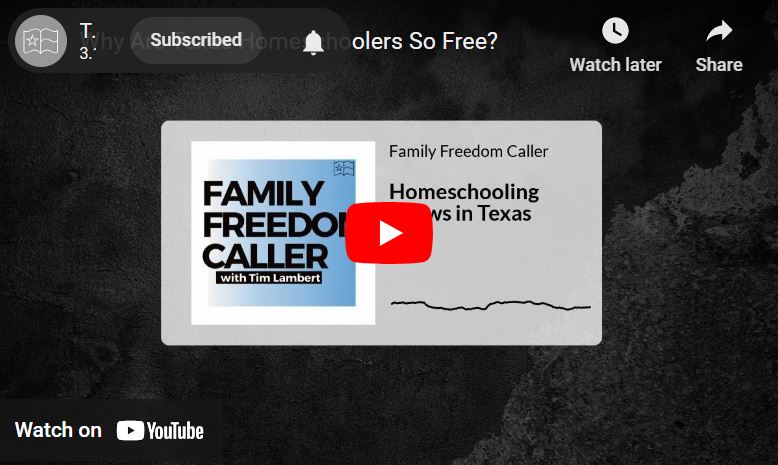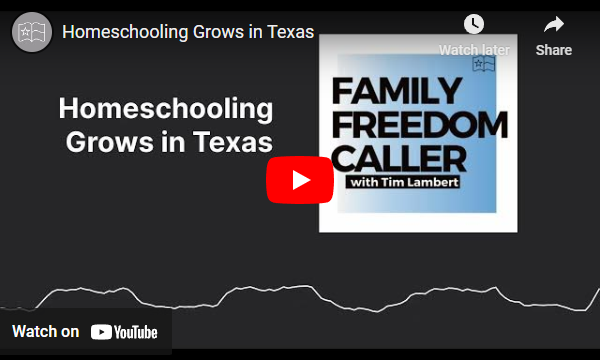By Lauren Kruse
My mother decided to homeschool my brothers and me when I was in kindergarten. It was not always easy, as we shed many tears through the years—especially with math! Through it all, she sowed important seeds that shaped our morals and worldviews. Because of that, I believe my brothers and I will produce good fruit that will be evident in our adult lives.
Before graduating, I began to consider whether I would homeschool my own children. When a friend asked me if I was going to homeschool my future kids, my response was: “Of course!”
Here are five reasons why I would homeschool.
You Can Educate Your Kids in the Fear and Admiration of the Lord
Scripture tells us that parents are to “train a child in the way he should go, so when he is old he will not turn from it.” (Proverbs 22:6) What a responsibility and an opportunity!
Above all else, the thing I cherish about homeschooling is that parents are better able to raise their children in a God-fearing atmosphere. It’s an opportunity to create a way of living that glorifies God.
At an early age, children are immersed in the lifestyle of a Christ Follower. In a Christian homeschooling environment:
- Prayer is not only allowed, it is encouraged
- Reading the Bible is a “school-sanctioned” activity
- Cooking for the needy is “home economics”
- Taking the cooked food to the needy doubles as a “field trip”
- The Theory of Evolution is taught as a theory, not a religion
- The Creation account in Genesis—as well as other accounts in the Bible—is a viable source for science
Homeschool Learning Takes Place In And Outside the Home
In our home, learning was not limited to the classroom and an eight-hour school day. We often took our school work to the park or on the road. Field trips included the George Ranch, College Station, the Blue Bell factory and numerous other places.
We were also taught life skills in the home. Cooking lunch and dinner doubled as schoolwork and sometimes science experiments, preparing a grocery list helped us to be smart shoppers, and clipping coupons to plan the grocery budget counted as Consumer Math.
As a homeschooler, my classroom was my bedroom, dining room, backyard, front yard, a park bench, a picnic table and even a trolley in Downtown Houston as we explored the city. Homeschoolers understand more than anyone else that the world is our classroom.
Homeschoolers Know How To Converse
An under-appreciated benefit of homeschooling is multi-generational socialization. Sounds fancy, right?
How many teenagers do you know that can relate to and talk with people five or six times their age? I have had the opportunity to interact with people in their seventies, eighties and even nineties. And, they’re pretty cool!
There is a regular customer at my work who is 83-years-old and qualifies for the “Most Interesting Guy In The World” commercial. There are many seniors at church that I enjoy hearing their stories, opinions and advice. On the opposite end of the age spectrum, I can even interact with toddlers and infants.
Homeschool Children are Sheltered—In a Good Way
Opponents of homeschooling argue that sheltering children is harmful because it hinders their ability to “function in the real world.” Yes, this happens sometimes. However, I believe that stereotype is the exception.
People who know me understand that I can function in society just as well as anyone else, even though I was raised in a so-called “sheltered environment.” Just like it is not true that all children suffer in public schools. I have some public school friends that became wonderful, responsible, God-fearing Christians in spite of their environment.
During my teen years, I was sheltered from some things, but I knew what was “out there.” Still, my parents were able to talk to me about drugs, alcohol and “the birds and the bees” before I was ready to encounter these things.
My 13-year-old brother had a different experience. He was at a loss during summer camp when other boys his age cracked lewd jokes. He was thinking as a kid should, with an innocent mind. Our “sheltered life” allowed us to remain exactly where we were supposed to as kids—not kids with adult knowledge.
Public School Could Never Be So Personal
I never had the desire to attend public school. My homeschooling experience resulted in a strong love and appreciation for my parents. My homeschool graduation was a perfect example: Mom and Dad standing by my side on stage; Dad hands me my diploma; I hand Mom a rose and I thank her for all that she did for me.
My mom and I may have argued like any teen and parent, but we deeply love each other. I have a lasting and loving relationship with my parents, and I have no burning desire to break free from their so-called “oppressive rule” to live “young, wild and free.”
Instead, after graduating from homeschool, I spent almost three years working while deciding on my career and college education path. I am now progressing toward a B.A. in education, with plans to pursue a Master of Divinity degree in seminary.
I am forever grateful for both of my parents’ sacrifices. I have never felt entitled to anything and greatly appreciate their role in raising up the next generation. That, my dear friends, is why I wish to homeschool my future children. (Thanks Mom and Dad!)
Now, my desire is to one day play a major role in my own children’s development standing alongside my husband, cheering them all the way. Then, when it’s their time to graduate, I will feel confident that I am sending not a lamb to the wolves, but rather a fully equipped soldier in Christ, whom I dearly love. Plus, who can beat pajama day every day at school?
By Lauren Kruse
My mother decided to homeschool my brothers and me when I was in kindergarten. It was not always easy, as we shed many tears through the years—especially with math! Through it all, she sowed important seeds that shaped our morals and worldviews. Because of that, I believe my brothers and I will produce good fruit that will be evident in our adult lives.
Before graduating, I began to consider whether I would homeschool my own children. When a friend asked me if I was going to homeschool my future kids, my response was: “Of course!”
Here are five reasons why I would homeschool.
You Can Educate Your Kids in the Fear and Admiration of the Lord
Scripture tells us that parents are to “train a child in the way he should go, so when he is old he will not turn from it.” (Proverbs 22:6) What a responsibility and an opportunity!
Above all else, the thing I cherish about homeschooling is that parents are better able to raise their children in a God-fearing atmosphere. It’s an opportunity to create a way of living that glorifies God.
At an early age, children are immersed in the lifestyle of a Christ Follower. In a Christian homeschooling environment:
- Prayer is not only allowed, it is encouraged
- Reading the Bible is a “school-sanctioned” activity
- Cooking for the needy is “home economics”
- Taking the cooked food to the needy doubles as a “field trip”
- The Theory of Evolution is taught as a theory, not a religion
- The Creation account in Genesis—as well as other accounts in the Bible—is a viable source for science
Homeschool Learning Takes Place In And Outside the Home
In our home, learning was not limited to the classroom and an eight-hour school day. We often took our school work to the park or on the road. Field trips included the George Ranch, College Station, the Blue Bell factory and numerous other places.
We were also taught life skills in the home. Cooking lunch and dinner doubled as schoolwork and sometimes science experiments, preparing a grocery list helped us to be smart shoppers, and clipping coupons to plan the grocery budget counted as Consumer Math.
As a homeschooler, my classroom was my bedroom, dining room, backyard, front yard, a park bench, a picnic table and even a trolley in Downtown Houston as we explored the city. Homeschoolers understand more than anyone else that the world is our classroom.
Homeschoolers Know How To Converse
An under-appreciated benefit of homeschooling is multi-generational socialization. Sounds fancy, right?
How many teenagers do you know that can relate to and talk with people five or six times their age? I have had the opportunity to interact with people in their seventies, eighties and even nineties. And, they’re pretty cool!
There is a regular customer at my work who is 83-years-old and qualifies for the “Most Interesting Guy In The World” commercial. There are many seniors at church that I enjoy hearing their stories, opinions and advice. On the opposite end of the age spectrum, I can even interact with toddlers and infants.
Homeschool Children are Sheltered—In a Good Way
Opponents of homeschooling argue that sheltering children is harmful because it hinders their ability to “function in the real world.” Yes, this happens sometimes. However, I believe that stereotype is the exception.
People who know me understand that I can function in society just as well as anyone else, even though I was raised in a so-called “sheltered environment.” Just like it is not true that all children suffer in public schools. I have some public school friends that became wonderful, responsible, God-fearing Christians in spite of their environment.
During my teen years, I was sheltered from some things, but I knew what was “out there.” Still, my parents were able to talk to me about drugs, alcohol and “the birds and the bees” before I was ready to encounter these things.
My 13-year-old brother had a different experience. He was at a loss during summer camp when other boys his age cracked lewd jokes. He was thinking as a kid should, with an innocent mind. Our “sheltered life” allowed us to remain exactly where we were supposed to as kids—not kids with adult knowledge.
Public School Could Never Be So Personal
I never had the desire to attend public school. My homeschooling experience resulted in a strong love and appreciation for my parents. My homeschool graduation was a perfect example: Mom and Dad standing by my side on stage; Dad hands me my diploma; I hand Mom a rose and I thank her for all that she did for me.
My mom and I may have argued like any teen and parent, but we deeply love each other. I have a lasting and loving relationship with my parents, and I have no burning desire to break free from their so-called “oppressive rule” to live “young, wild and free.”
Instead, after graduating from homeschool, I spent almost three years working while deciding on my career and college education path. I am now progressing toward a B.A. in education, with plans to pursue a Master of Divinity degree in seminary.
I am forever grateful for both of my parents’ sacrifices. I have never felt entitled to anything and greatly appreciate their role in raising up the next generation. That, my dear friends, is why I wish to homeschool my future children. (Thanks Mom and Dad!)
Now, my desire is to one day play a major role in my own children’s development standing alongside my husband, cheering them all the way. Then, when it’s their time to graduate, I will feel confident that I am sending not a lamb to the wolves, but rather a fully equipped soldier in Christ, whom I dearly love. Plus, who can beat pajama day every day at school?











